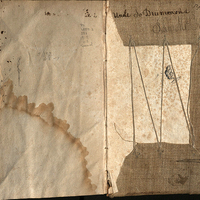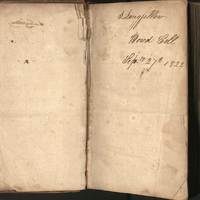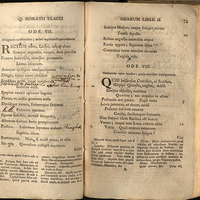
Academics
Like Harvard University on which it was modeled, Bowdoin College offered a rigid classical education to its students. Applicants had to sit for an admissions examination and demonstrate proficiency in both Greek and Latin, along with an understanding of arithmetic, geography, and classical works such as Cicero’s Selected Orations and Virgil’s Aeneid. They also needed to produce a certification of their good moral character, a prerequisite for identifying students who could work to advance the common good.
Once admitted, all students followed the same curriculum; there were no electives although upperclassmen could attend lectures at the Medical School of Maine, then part of Bowdoin College, for an additional fee. Special Collections & Archives holds a copy of nearly every textbook assigned to the Class of 1825, including some that were Henry Wadsworth Longfellow’s personal copies. Perhaps due to the expense of books, faculty structured the curriculum so that many of textbooks were used for two or more years; in the case of the assigned mathematics textbook, Webber’s as it was called, short for Mathematics, compiled from the Best Authors, and Intended to be the Text-Book of the Course of Private Lectures of these Sciences in the University at Cambridge by Samuel Webber, the President of Harvard University, students used this same textbook for all four years.
Cornelis Schrevel’s Lexicon manuale graeco-latinum et latino-graecum, by 1818. Together with: The Holy Bible: containing the Old and New Testament, 1818.
In addition to their assigned textbooks, students routinely had personal copies of reference and other books. These two books were owned by Stephen Longfellow, Henry’s older brother and fellow member of the Class of 1825. Stephen was a willful child and caused his parents’ considerable concern. They sent Henry and Stephen to Bowdoin together and in the same class in part so the younger brother could keep an eye on the elder. Still, Stephen managed to routinely land in trouble for throwing parties, skipping class, and introducing alcohol to his classmates. Eventually, Stephen was expelled for four months during his senior year. The many doodles on his Greek-Latin dictionary, acquired during his sophomore year, perhaps speak to his lack of engagement with the academic program.
Horace and Joseph de Jouvency. Q. Horatii Flacci Carmina expurgata. Apud Gulielmum Hilliard, 1806.
This copy of Horace, a required textbook, was used by Henry Wadsworth Longfellow while a student at Bowdoin. It was subsequently passed to at least one other student, Jesse Appleton Nason, a non-graduate of the Class of 1838. There are contemporary markings, drawings, and annotations throughout; some may be in Longfellow’s hand although they have not been definitively identified.



